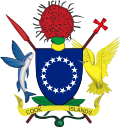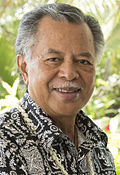This article needs additional citations for verification .(March 2023) |
| Prime Minister of the Cook Islands | |
|---|---|
| Minitia Ma‘ata o te Kūki ‘Airani (Cook Islands Māori) Paraimi Minita o te Kūki Airani (Penrhyn) | |
 | |
 | |
| Type | Head of government |
| Abbreviation | PM |
| Member of | Cabinet of the Cook Islands, Parliament |
| Seat | Avarua |
| Appointer | King's Representative to the Cook Islands |
| Term length | At His Majesty's pleasure |
| Constituting instrument | Constitution of the Cook Islands [1] |
| Precursor | Leader of Government Business |
| Formation | 4 August 1965 |
| First holder | Albert Henry (As Premier) |
| Deputy | Deputy Prime Minister of the Cook Islands |
 |
|---|
The prime minister of the Cook Islands is the head of government of the Cook Islands, a self-governing territory in free association with New Zealand. The office was established in 1965, when self-government was first granted to the islands. Originally, the title "Premier" was used, but this was replaced by the title of "Prime Minister" in 1981.









